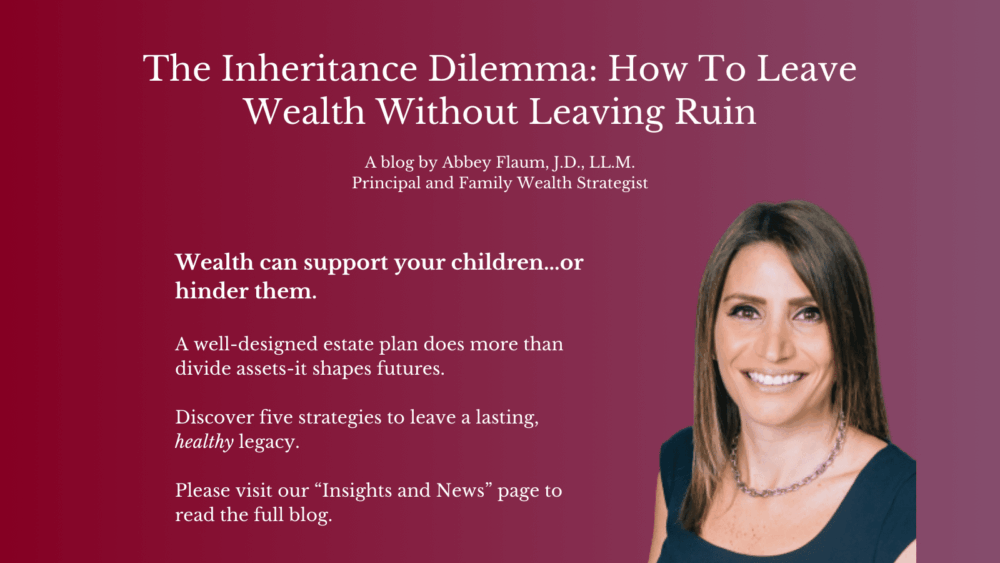Having practiced estate planning law for nearly two decades, I have come to strongly believe that the most effective estate plans do more than minimize taxes and distribute assets efficiently. The best estate plans preserve family harmony, reflect core values, and support meaningful legacies. Yet even among highly personalized plans, one universal question often emerges: How much is too much to leave your children?
Affluent families often walk a delicate line between providing opportunity and enabling entitlement. They want to offer every advantage – exceptional education, security, freedom to pursue passions – while avoiding the unintended consequences of unearned wealth. Warren Buffett famously summarized this sentiment when he explained that he wished to leave his children ‘enough so they could feel they could do anything, but not so much that they could do nothing.’
So, how do parents of substantial means provide responsibly for future generations? The answer lies not in a fixed dollar amount, but in thoughtful design and intentional structure. For one family, $5 million may feel like a windfall, while for another, $100 million may be appropriate and well-managed. For most people, inheritances for children become problematic when they so generously provide for the children that they feel enough financial comfort to strip away their motivation to find purpose. Without the drive to create something of their own, young adults may drift, lacking direction or ambition. Large, unrestricted inheritances may also unintentionally enable harmful behaviors like reckless spending, dependency, or even addiction. Family dynamics may suffer too. Wealth, when not clearly explained or thoughtfully distributed, often fuels tension and resentment within the close and extended family, leading to fractured relationships. In some cases, the receipt of too much money too soon may delay (or eliminate) emotional and financial maturity entirely, leaving adult children ill-equipped to make meaningful life decisions and ensuring that the “shirtsleeves to shirtsleeves in three generations”[1] adage remains true. Ultimately, an inheritance that undermines independence, distorts values, or disrupts family harmony is, by definition, too much. That is why smart estate planning must consider not just the psychological and relational impact of inherited wealth, but the structure of the inheritance itself.
There is a wide range of estate planning tools available to families that allow them to support their children without enabling complacency. The following are just a few strategies for affluent families who wish to pass on wealth without leaving ruin:
Dynastic Trusts
Early in my career, it was common to see trusts structured to distribute assets outright (free of trust) to children at ages twenty-five, thirty, and thirty-five. The result? Adult children often had access to life-changing wealth before they developed the necessary maturity or life experience to manage it well. Today, the tides have turned, and more affluent parents are incorporating dynastic trusts for their children and future descendants into their estate plans.
A well-structured dynastic trust does more than preserve wealth; it provides guardrails. It may fund education, entrepreneurial pursuits, and major life expenses while protecting assets from creditors, divorce, and excessive taxation. It also prevents descendants from having full, unchecked access that may discourage personal ambition. With carefully considered provisions and a thoughtful trustee selection, dynastic trusts may promote stewardship, responsibility, and long-term family continuity.
Incentive Trusts
For families concerned about how inherited wealth will shape their children’s behavior, incentive trusts may offer a balanced approach. These trusts link distributions to specific milestones or behaviors like earning a degree, maintaining employment, remaining substance-free, or engaging in philanthropy.
Crafting an effective incentive trust requires nuance. A provision that matches a beneficiary’s salary, for example, may unintentionally penalize one child while disproportionately rewarding another. What if one child is a successful entrepreneur while another is a dedicated schoolteacher or family caregiver? The key is to build in flexibility for the assessment of context, reason, and intention of the trust’s creators; this is often accomplished by empowering trustees to adapt based on evolving circumstances and intent.
Incentive provisions may also be layered into dynastic trusts, enabling long-term support that evolves with the beneficiary’s life journey, while remaining true to the family’s core principles.
Lifetime Gifts of Experience
Sometimes, the most impactful gifts are not financial. Experiential giving, or funding transformative opportunities during your lifetime, may prepare heirs for responsibility more effectively than a lump sum ever could.
Consider helping a child launch a business, pursue a passion project, or travel abroad with purpose. These experiences build confidence, decision-making skills, and resilience. More importantly, they give you, the parent, a front-row seat in your child’s development. You offer guidance, not bailouts; mentorship, not micromanagement.
These “gifts of experience” also reveal how your child handles responsibility—insights that may shape future estate planning decisions. In the best cases, they cultivate independence, purpose, and maturity—traits that no amount of money alone can teach.
Family Meetings and Legacy Letters
Even the most sophisticated estate plans may unravel if your heirs do not understand them. That is why many families are embracing intentional communication—through structured family meetings and legacy letters—to ensure their planning reflects more than just financial decisions.
Family meetings create space for dialogue about shared values, philanthropic goals, and the reasoning behind key decisions. When facilitated thoughtfully (often by a trusted advisor), these conversations foster transparency, manage expectations, and reduce the risk of future conflict.
Legacy letters, or ethical wills, are a more personal expression of your intentions. These documents share the story behind your wealth: how it was earned, what it represents, and how you hope it will be used. They are your chance to speak directly to your children—not just about what you are leaving them, but why. This clarity may prevent resentment, promote understanding, and provide moral guidance long after you are gone.
Philanthropy as a Tool for Teaching Responsibility
Philanthropy is one of the most effective tools for helping heirs develop empathy, strategic thinking, and a sense of accountability. Involving your children in charitable giving—whether through a donor-advised fund, family foundation, or informal giving circle—invites them to think about wealth in terms of impact, not just consumption.
It does not have to be grand at the outset. Let them help choose causes to support or match their charitable donations. Over time, they may take on greater roles, such as evaluating nonprofit proposals or managing grantmaking initiatives. This process encourages collaboration, sharpens financial decision-making, and reinforces the idea that wealth is a tool…not a trophy.
Philanthropy may become a defining pillar of your family’s legacy. It provides balance, purpose, and a deeply rooted sense of obligation to give back; a counterweight to the temptations of entitlement.
In the end, the question is not just how much you leave your children – it is how you leave it. When wealth is transferred without intention, it may undermine the very values you hope to preserve. But with thoughtful planning, open communication, and value-based strategies, you may leave your children something far more valuable than money alone. Clarity. Purpose. A foundation on which to build a life of meaning…all elements of a legacy well left.
[1] ”Shirtsleeves to shirtsleeves in three generations” refers to the common pattern where family wealth is built by one generation, preserved by the next, and often lost by the third, highlighting the challenges of sustaining wealth across generations.
If you have any questions or would like to discuss this further, please reach out to your client service team, call us at 404.264.1400, or visit us on the web at HomrichBerg.com.
Important Disclosures
This article may not be copied, reproduced, or distributed without Homrich Berg’s prior written consent.
All information is as of the date above unless otherwise disclosed. The information is provided for informational purposes only and should not be considered a recommendation to purchase or sell any financial instrument, product, or service sponsored by Homrich Berg or its affiliates or agents. The information does not represent legal, tax, accounting, or investment advice; recipients should consult their respective advisors regarding such matters. This material may not be suitable for all investors. Neither Homrich Berg, nor any affiliates, make any representation or warranty as to the accuracy or merit of this analysis for individual use. Information contained herein has been obtained from sources believed to be reliable but are not guaranteed. Investors are advised to consult with their investment professional about their specific financial needs and goals before making any investment decision.
©2025 Homrich Berg.


